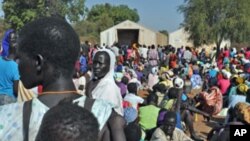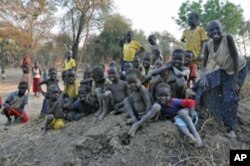Desperation and hunger are growing in South Sudan's Doro refugee camp where more than 20,000 people have fled bombings in Sudan's Blue Nile state in recent weeks. Thousands more refugees are expected to arrive at this unprepared makeshift camp seeking safety and services.
At a woodland camp in South Sudan’s Upper Nile State, hundreds of people surround a few plastic tables where aid agencies are registering about 1,000 refugees daily. They say they are fleeing aerial bombardment in Sudan’s war torn Blue Nile state.
Aid agencies expect by the end of the year that some 30,000 people will be in Doro, about 40 kilometers from the border with Sudan. The majority arrive sick and hungry, having made the long journey by foot.
Food shortage
Raking his fingers through the dust and straw, and holding bits to his mouth, Naam Mahadin said his family of 13 has not eaten since they got here last week, as they were too exhausted to register.
“We walked here. And when we got tired we would sleep by the side of the road. If we did not get a chance to stop and sit down to make a fire, we just ate handfuls of sorghum we were carrying raw," said Mahadin. "When we arrived, I had to lie down for five days as I was so tired. We hope we will be given food now that we register.”
Many others in the camp who arrived weeks ago are still hungry. The U.N.’s World Food Program battles logistical and supply problems to get enough food into this remote area as more people pour in.
Conflict has raged in Blue Nile state between Sudan government troops and forces that fought alongside South Sudan before it gained independence in July.
Myriad challenges threaten
Village Chief Oura Kina said all of Shali village’s 5,000 residents ran away when Sudan’s Antonov planes bombed in November. But Kina said some are using what little energy they have to make the dangerous trip back to Blue Nile to fetch food as panic sets in at the lack of food to feed children whose bellies are swelling.
“It’s very bad for the people of Shali being here in Bunj. The life here will be very hard for us as there is no food or water," said Kina. "People keep on asking me, 'the children are hungry, how are we going to survive in this place?' I’ve heard about and seen people who have walked back home to bring food. Even as we speak now, some are on the way there and some coming back.”
With refugees still sleeping rough after carrying very little with them, or leaving items on the way and no sanitation facilities in the camp, aid agencies are dealing with a wide range of sicknesses. There is fear of disease outbreaks due to a lack of toilets and water.
Charity ramps up
Medical charity Doctors Without borders [MSF] arrived in Doro at the beginning of December to run a clinic, and have seen high levels of malnutrition, malaria, skin diseases and respiratory diseases from a lack of shelter, food and sanitation.
Speaking from MSF’s camp in Doro, as noisy crickets chirp in the background, Emergency Field Coordinator Asaad Khadhum said the charity also is planning a mobile clinic and one near the border to try and treat people early that otherwise might not survive the arduous journey.
“It’s a long walking distance for them and we had some concerns about their health status while they are making this trip, etcetera, for four, five days, it is very tiring. And if the people have a sort of sickness or health issues on the borders, they really cannot make it,” said Khadhum.
The state government in Upper Nile has wider concerns over food security and health services for up to 100,000 people. It says that in addition to an expected 30,000 people in Doro by the end of December, Maban county has received an additional 15,000 returnees from the north since southern secession, and flooding in August ruined local harvests.
While aid agencies rush to treat widespread hunger and disease in Doro, all hopes are on a good January harvest to prevent a food crisis next year.





